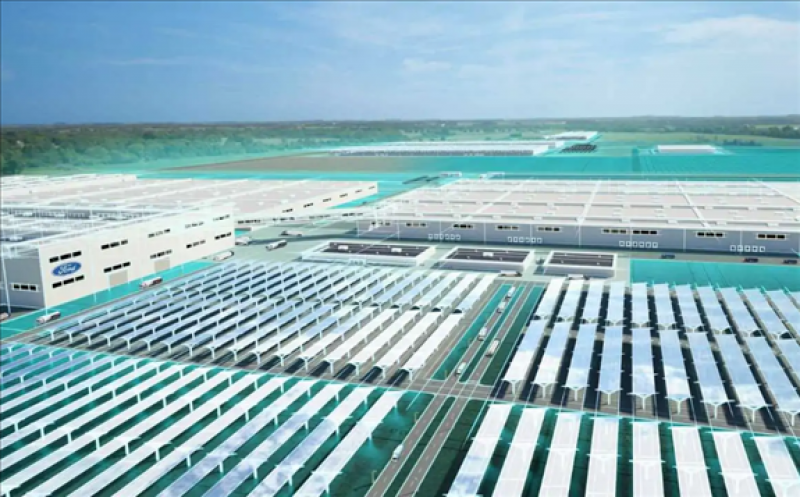Ford has announced that it will lead America's shift to electric vehicles with two new massive investments in the U.S.

Together with its battery partner, SK Innovation, Ford will build manufacturing campuses - "mega-sites" - in Tennessee and Kentucky that will produce the next generation of electric F-Series trucks and the batteries (three gigafactories - total of 129 GWh annually) to power future electric Ford and Lincoln. Production will start in 2025.
The total investment is estimated at $11.4 billion ($7 billion directly from Ford) and will result in 11,000 jobs. The remaining $4.4 billion will come from SK Innovation, which is a joint venture partner in BlueOvalSK announced in May.
We estimate that the battery plants (43 GWh annually each) will cost about $2.9 billion each or $8.7-$8.8 billion total (shared 50/50 between Ford and SK Innovation).
Let's get into the details of each site.
Blue Oval City in Tennessee
According to Ford, the Blue Oval City will be the largest, most advanced and most efficient auto production complex in its 118-year history. An important thing at this site will be vertical integration of production, starting with battery cells up to the final assembly of the vehicles.
The site will produce the next-generation electric F-Series pickups (beyond the Ford F-150 Lightning that will be produced at the Ford Rouge Electric Vehicle Center in Dearborn, Michigan starting in early 2022), as well as lithium-ion batteries. The BlueOvalSK gigafactory will have a capacity of 43 GWh cells annually.
The investment is estimated at $5.6 billion total, while the number of jobs will reach 6,000. The cost of the battery gigafactory will be shared with SK Innovation, through the BlueOvalSK joint venture.
"Reimagining how electric vehicles – and the batteries that power them – are designed, manufactured and recycled, Ford is creating an all-new electric vehicle manufacturing ecosystem."
"Blue Oval City will be among the largest auto manufacturing campuses in U.S. history. Like the iconic Rouge complex in Michigan did a century earlier, Blue Oval City will usher in a new era for American manufacturing."
"The 3,600-acre campus covering nearly 6 square miles will encompass vehicle assembly, battery production and a supplier park in a vertically integrated system that delivers cost efficiency while minimizing the carbon footprint of the manufacturing process. The assembly plant will use always-on cloud-connected technologies to drive vast improvements in quality and productivity. The mega campus is designed to add more sustainability solutions, including the potential to use local renewable energy sources such as geothermal, solar and wind power."
"Creating approximately 6,000 jobs, Blue Oval City will be a hive of technical innovation to build next-generation electric F-Series trucks. This growth opportunity will allow Ford to reach new customers with an expanded electric truck lineup."
Ford does not reveal which F-Series trucks are coming (the lineup to be expanded by electric models), but at this scale, it might be the electrification of basically the entire lineup.
The company notes also the environmental impact of the site to be minimal:
"Despite its size, the assembly plant at Blue Oval City is designed to have as minimal an impact as possible on the surrounding environment – and even to generate positive impacts. The assembly plant’s goal is to have a regenerative impact on the local environment through biomimicry in design of the facility. From the start of production in 2025, Ford’s goal is for the assembly plant to be carbon neutral.
Through an on-site wastewater treatment plant, the assembly plant aspires to make zero freshwater withdrawals for assembly processes by incorporating water reuse and recycling systems. Zero-waste-to-landfill processes will capture materials and production scrap at an on-site materials collection center to sort and route materials for recycling or processing either at the plant or at off-site facilities once the plant is operational.
Ford is collaborating with Redwood Materials, a leading battery materials company, to make electric vehicles more sustainable and affordable for Americans by localizing the supply chain network, creating recycling options for scrap and end-of-life vehicles, and ramping up lithium-ion recycling. Ford believes battery recycling is essential for the success of an electrified future and has the potential to offer significant economic benefits as well as help solve for end-of-life battery recycling."